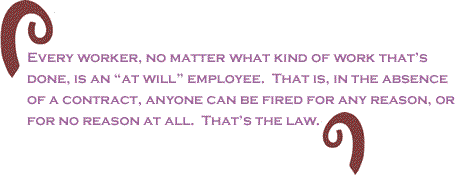| If
the U.S. wants to create jobs, why not send the work to
the place that apparently has created the most jobs in the
past two decades�China?
Notwithstanding
that China has been shedding jobs at a dizzying rate ever
since the American and European economies began to tank,
they still have a lot more jobs than North America and Europe.�
They have done this with the help of American corporations,
but, clearly, China has not been able to create the jobs
that are needed in the U.S., so we can�t outsource job-creation.
The
paradox is that China has been creating jobs in the U.S.
for many years.� They are jobs in the service industries
and in retail.� It got to be a bad joke as long ago as the
1980s that people with master�s degrees and Ph.D.s were
asking the obligatory question, �Do you want fries with
that?�
And
it was the same with people in the �information technology�
(IT) line of work and those involved in so many ways with
work on computers and computer systems.� A whole new category
of work sprung up around those �industries.�� The people
in them, although they apparently are paid well (for people
as young as they often are), were just so much surplus machinery.�
They got no benefits, they got no pensions, they could not
complain about long hours (with no overtime) or lack of
paid sick time or vacations, and there was no way to redress
grievances.
There
were no grievances, because there were no grievance procedures.�
One can make use of a grievance procedure only if there
is one written somewhere.� Usually, it is only the employer
who has a copy, if there is such a procedure, unless there
is a union contract.� For the most part, the jobs are precariously
held and those who do that kind of work live with the knowledge
that they can be fired at any time.� That�s the way it is
in America:� Every worker, no matter what kind of work that�s
done, is an �at will� employee.� That is, in the absence
of a contract, anyone can be fired for any reason, or for
no reason at all.� That�s the law.

President
Obama has announced a job-creation effort by his administration
and he believes that taxing the rich for their fair share
of the tax burden will produce $1.5 trillion that will go
a long way toward creating new jobs.� The rich this week
complained bitterly that Obama�s tax revenue plan is tantamount
to �class warfare.�� That�s what Rep. Paul Ryan (R-Wis.),
chairman of the House Budget Committee, cried loudly.� So
did Senate Minority Leader Mitch McConnell (R-Ky.) and House
Speaker John Boehner (R-Ohio).�� If what they and their
kind in Congress have done for the past many years to the
working class and, now, the middle class, had not been so
destructive, it would be laughable.
What
they and their like have done, in service to their masters
in Corporate America, to divide the country into (very few)
haves and (the vast majority) have-nots, is nothing less
than class war.� Then, when the tables seem as if they might
begin turning, they cry like little children whose trip
to buy a new computer game has been canceled.� Ryan and
McConnell do not want to see their rich benefactors pay
another nickel in taxes.
Fortunately
for Obama, he has a billionaire on his side.� Warren Buffett,
one of the richest men in the world, has said in many places
that people like him should be paying more in taxes.� He
pays less (as a percentage) in taxes than his secretary
and he thinks that is unfair.� However, the right wing politicians,
economists, and broadcast brayers have called him out on
his remark.� They even have called him anti-capitalist.�
Imagine the mental dysfunction of all of them to call someone
who has become so rich in a capitalist economy an anti-capitalist.�
Now, that�s dysfunction and that�s craziness.
Not
being grounded in the reality-based world, the nation�s
right wing will continue to say things that are obviously
not true and know that a sizable minority of Americans will
sit back and say, �Yeah, that�s right.�� And, they will
vote these minions of Corporate America another term of
office.� Unfortunately, those who represent the American
people seem to be without power and that�s why the prospect
of new jobs by the millions seems to be a pipe dream.
Corporate
America has spent the last half-century designing and building
a U.S. economy that will enrich them as much as possible,
without causing the collapse of the entire structure.� Until
recent years, they seem to have done just that.� It took
a while, but they managed to get rid of most of our heavy
industry and they have sent much of our manufacturing base
to other countries.� They have parked their money in little
countries and principalities that take not a nickel of their
money for taxes and they have showered us with service and
retail jobs and told us that this is an economy.
Meanwhile,
hundreds of thousands of our young people come out of college
with a burden of $40,000 or $50,000 of debt and are thrown
on the job market.� It is the hope of Corporate America
that they will find a job in a Starbucks coffee house or
a luxury hotel and that they will not show up on the unemployment
rolls.� We have come to the end of that corporate fantasy.�
Even those jobs are not easy to come by, since there are
five applicants for every job opening.� Besides, one cannot
pay for food, clothing, and shelter, and pay back
college loans on what are essentially low-wage jobs like
that.�

If
Obama�s jobs are going to be good ones (that is, jobs that
will allow a worker to live decently and provide for health
care, other benefits, and a pension), we�ll have to see
the return of manufacturing and industry.� It took us 40-50
years to get to this point, so this return is not going
to be an easy one for workers or for the nation.� We�ll
have to give the president a point or two for trying.�
The
alarming thing (for those who are alarmed at such things)
is that corporations are getting rid of jobs at a great
rate.� General Electric has rid itself of tens of thousands
of workers in the past few years, the U.S. Postal Service
has sent scores of thousands into retirement or the unemployment
lines and recently, Bank of America announced that it would
get rid of some 30,000 workers and close hundreds of branches.�
With all of the announced lay-offs and planned future lay-offs
by hundreds of companies, it�s a wonder that the official
unemployment rate remains at 9.1 percent.� The business
press also is reporting that small businesses, which are
held hostage by the banks, also are laying off workers or
hesitating to hire new workers.
The
military and defense contractors are weighing in on the
debate, by warning that, if defense budgets are cut, there
will be an increase in unemployment.� The U.S. military,
already taking more of the national budget than the militaries
and defense budgets of all other countries combined, is
threatening to add to America�s economic woes if we rein
in the spending on wars and planning for wars.
Corporations
fear that the unlimited profits that come from war will
be curbed.� They love war.� In what other business is stuff
manufactured by the hundreds of billions of dollars worth,
just so it can be destroyed and replaced?� It�s a perfect
pipeline from the pockets of the working and middle classes
into the vaults of the corporations and the rich.� It�s
why wars are so pleasurable and convenient for them.� Best
of all?� It�s not their sons and daughters who die in those
wars.
The
outrageous costs of America�s defense and military establishments
don�t seem to have any limits, and our society and nation
show it.� Even a portion of that total cost would improve
and fund excellent schools, provide health care for all,
boost the quality of housing stock and, therefore, our communities,
and would provide food enough that Americans do not go hungry,
as they do now.� Rail service, light and heavy, could be
restored, as could roads and bridges.� At this time, things
seem to be falling apart and the rich, having been given
much in welfare benefits, are reluctant to share with the
rest.
Consumerism
is what is generally described as the engine of the U.S.
economy.� To make that kind of economy vibrant, one needs
the masses out in the malls, buying whatever they can find,
whatever advertising has made appealing to them.� The masses
are running out of easy-spending money and that does not
bode well for the economy.� If things were made in America,
if manufacturing were to come back, the economy might not
be in such a precarious position.
Republicans
across the country are demonizing workers, especially if
they are in unions.� They have done everything they can
to destroy what�s left of the union movement, having set
their sights on public workers (teachers first, then highway
workers, postal workers, firefighters, engineers) and, after
that, they will go after the other workers.� So, no worker
can look to the GOP for any help�for anything.� They can
look to the Democrats for a sympathetic word.
The
hope of many Americans is that the jobs that are created
by Obama�s program will be of a new kind and that they will
acknowledge the condition that the environment is in and
will be along the lines of a burgeoning �green economy,�
something like China�s.� The Chinese, despite their own
economic and environmental problems, are far ahead of the
U.S. in its solar and wind power-generating industries.�
It is possible that we can follow their lead and create
millions of new jobs and tens of thousands of new companies
that will acknowledge the end of cheap oil that will forever
change the American economy and society.

Or,
considering that the Republicans have the monumental power
of their negativity, the GOP may block anything that will
change the status quo, where the money simply flows to the
top one or two percent of the population and job creation
stagnates to the point that the Great Depression will begin
to look pretty good.
It
is up to the people.� The broken system is not going to
produce the jobs and the living standard that we have had
since the end of World War II.� Elected officials of either
party are not especially trustworthy in their ability to
envision and carry out a jobs program that will transform
the economy in which everyone will have opportunity for
a decent life.
That
will take some reshuffling of the structure of the economy
and a reconsideration of what Americans have come to view
as �the good life.�� If the people can come together, they
will accomplish this and, perhaps, find that opulence and
ostentation are not things toward which we should strive.�
Our survival as a nation will depend on our ability to see
this and use common sense to achieve the change we need.

BlackCommentator.com Columnist, John Funiciello, is a labor organizer and former union
organizer. His union work started when he became a local
president of The Newspaper Guild in the early 1970s. He
was a reporter for 14 years for newspapers in New York State. In addition to labor work, he is organizing family
farmers as they struggle to stay on the land under enormous
pressure from factory food producers and land developers.
Click here to contact Mr. Funiciello.
|

